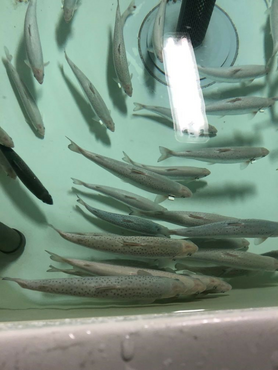What is the BlueInvest Project Pipeline?

AQUAEXCEL2020 - AE-FishBIT
Prof. Jaume Pérez-Sánchez has more 30 years of research experience in fish nutrition and growth. He has authored more than SCI 165 articles and book chapters. He is an authority in Fish Nutrigenomics and has developed new fish feed formulations and has achieved the second release of gilthead sea bream genome (doi:10.3389/fmars.2019.00760). He has leaded multiple EU and National projects and research contracts with Aquaculture and Aquafeed companies
AE-FishBIT contributes to monitor the environment and farmed animals. Such approaches increase the knowledge of the impact of climate change on aquaculture production systems, contributing to mitigate the impact of climate change through the selection of more robust and resilient organisms for sustainable fish farming, (1) meeting the increasing human food demand, and (2) preserving the biodiversity and wildlife of marine ecosystems.
AE-FishBIT contributes to monitor the environment and farmed animals. Such approaches increase the knowledge of the impact of climate change on aquaculture production systems, contributing to mitigate the impact of climate change through the selection of more robust and resilient organisms for sustainable fish farming, (1) meeting the increasing human food demand, and (2) preserving the biodiversity and wildlife of marine ecosystems.
.png)
What is the BlueInvest Project Pipeline?
The BlueInvest Project Pipeline is a database and showcase of projects, scale-ups and SMEs who are driving innovation and sustainability in the Blue Economy.
The projects featured are innovative, scalable and sustainable business ventures from traditional and emerging sectors of the maritime economy.
The aim is to facilitate connections between projects and investors, helping innovative ventures gain visibility and access to funding opportunities.
Want to be featured?
Login to the BlueInvest community & Submit your project
Selection criteria
- Your company is EU-based or from an eligible sea basin region (Georgia, Turkey, Ukraine, Moldova, Montenegro, Albania, Bosnia-Herzegovina, North Macedonia, Serbia, Israel, Egypt, Tunisia, Algeria, Morocco, Lebanon, Syria, Libya, Mauritania, United Kingdom, or Norway)
- Your project TRL is 4 or higher
- Your project sector is in one of the 10 blue economy sectors identified for this initiative
- Your solution has a clear sustainable impact on the blue economy
- Your project is looking for investment